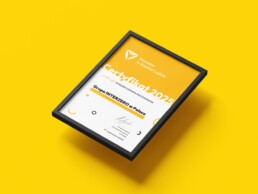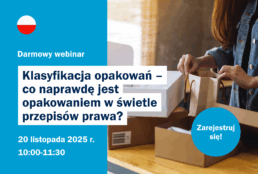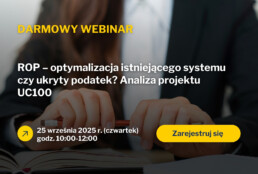Merry Christmas from Interzero

On the occasion of Christmas and the upcoming New Year, we would like to wish you warm wishes.
May this festive season bring you peace, rest and joy with your loved ones. We also wish you health, prosperity and success in the coming year, both in your professional and private lives.
Merry Christmas and a happy New Year!
Best wishes from the Interzero Group in Poland
We are very proud to announce that our company has joined the group of winners of the prestigious „Investor in Human Capital” certificate!
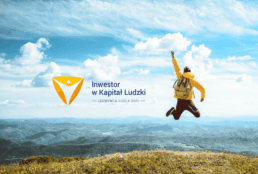
News
For us, the certificate is confirmation that, as an organisation we are moving in the right direction - we are creating a workplace that focuses on people, their potential and opportunities for development. It is also a signal to candidates that we are the right employer for talent: ambitious people who want to grow with us, pursue their professional passions and have a real impact on the company's development.
Many thanks to all Employees for taking part in the survey and the impressive turnout - 83%!
Your voices are the most valuable guidance for us. Thanks to your openness, we can design activities that respond to real needs and support the creation of an open and inspiring working environment.
This accolade is not only something to be proud of - it is also a commitment. Further challenges ahead, because we want to consistently develop the initiatives we have started and strengthen our organisational culture.
Thank you for your trust, energy and daily commitment.

Thanks to you, we can proudly wear the title of „Investor in Human Capital” - and together build a company that attracts talent, inspires and gives space for development.
Interzero management in Poland
Interzero offices are closed on 10 November 2025.
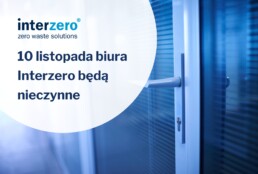
Information about the day off
On 10 November 2025, by decision of the Board of Directors, the Interzero offices will be closed.
We apologise for any inconvenience.
Interzero webinar: "Packaging classification - what really is packaging under the law?".
- Date: 20.11.2025.
- Form: online
- Participation: free of charge (registration required)ð
Scope:
During the meeting, our expert Paweł Sosnowski, Board Representative for Environmental Regulation, will discuss:
- Definitions of packaging under the current Polish Packaging and Packaging Waste Management Act.
- Definitions of packaging and the provisions of the PPWR.
- Examples of products that meet or do not meet the definition of packaging.
- Multi-material packaging. Standard EN 13429:2004 "Packaging - Multiple use".
- Multi-material packaging versus composite packaging - the current definition and the definition established by the PPWR.
Packaging classification and PPWR
Regulation PPWR is a key element of the EU's strategy for a circular economy. It introduces uniform rules for all Member States on the design, labelling, reuse and recycling of packaging. For companies, this means that they need to re-examine which products actually meet the definition of packaging and what obligations result from this.
During the webinar, we will show how to prepare for these changes and how to interpret the new regulations in practice to avoid errors in classification and reporting.
Interzero with the Golden Innovation! Our Waste Platform is revolutionising the industry
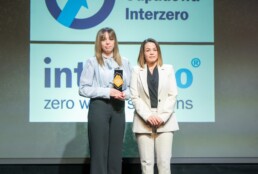
News
Our solution addresses the real challenges facing businesses today - from complex legal obligations to the need to realistically support the goals of the Closed-loop Economy (GOZ).
The genesis of innovation: Responding to a market gap
The impetus for the platform was the rapidly increasing complexity of legal obligations that have fallen on businesses - including those related to the Waste Data Base (BDO) system and Waste Transfer Cards (KPOs).
As he explains Aleksandra Mikiel, Head of Digital Solutions and Transformation at Interzero:
"In the retail sector, in retail chains or in manufacturing plants, where we have to deal with many branches, this complexity becomes a real operational brake and a significant administrative cost. (...) The market was lacking such a comprehensive system. The Interzero Waste Platform is our answer to this gap - a tool that ensures compliance, maximum efficiency and allows companies to focus on what they do best: their business."
Key features that change the rules of the game
The Interzero platform goes beyond the role of a passive inventory system. It is an active, integrated tool that combines logistics, record-keeping and advanced reporting.
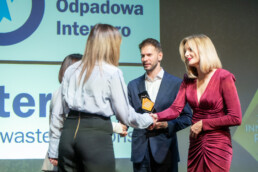
What makes our solution different?
- Full, proprietary integration with BDO: This is not just a superficial exchange of data. We are talking about the automatic generation and correction of KPOs and the automatic downloading of data to Waste Inventory Cards (KEOs).
- 'Game-changer' for managers: An absolute novelty is the possibility of changing KPO statuses (e.g. transport confirmation) directly from the platform, without having to log into the BDO system.
- Deep automation of logistics: The platform allows remote ordering of pickups 24/7, and can also create a pickup request itself when a container fill sensor sends a push notification - without human intervention.
Centralisation and mobility: The tool becomes a digital repository for all environmental documentation. Full access is possible from any device, and the new app Interzero OneApp brings key functions (such as overflow reporting or calendar view) right into the user's pocket
Measurable impact: Efficiency and Sustainability
The impact of the Waste Platform on business is immediate and measurable.
- Operational efficiency: Our customers report saving hundreds of hours per monthThe audit process is now more efficient than the manual handling of KPOs and records. Full automation drastically reduces human error and simplifies audit processes, which is crucial in multi-branch companies.
- Sustainability (ESG and GOZ): The platform is a powerful tool to support sustainability. It gives full transparency and much better control over waste streams. This directly translates into:
- Increasing recycling rates.
- Increase revenue from raw material sales through intelligent recommendations.
- A solid foundation for robust ESG reporting.
- Measurable environmental impact: The elimination of tonnes of paper documentation and the reduction of CO2 emissions through intelligent optimisation of logistics.
The future: AI analytics and further development
For us, the Golden Innovation Award is confirmation of the right direction, but we are not stopping.
"The waste management industry is in a permanent digital transformation and we want to not only keep up with it, but be at the forefront of it." - emphasises Aleksandra Mikiel.
We are investing heavily in the development of the Interzero OneApp mobile app and in advanced data analytics and AI mechanisms. Our goal is that in the near future the platform will be able to intelligently predict and recommend optimal actions, e.g. suggesting the best time to collect a container.
On behalf of Interzero, the award was received by: Aleksandra Mikiel - Head of Digital Solutions and Transformation and Agata Ryś - Member of the Management Board of Interzero. Interzero would also like to thank all the staff involved in the project - in particular Aleksandra Mikiel and Monika Szychulska, Digital Solutions Project Manager, for her work in creating and continuously developing the Platform system.
This award is a strong motivator for us to continue developing innovative solutions in the spirit of sustainability. We encourage you to visit the platform's website and find out more - click here and find out how your company can benefit.
Are you interested in using the Waste Platform for your company? Get in touch with us! Write to us at platformaodpadowa@interzero.pl and test our tool.
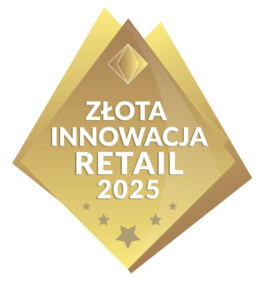
Interzero implements strategic educational project on GOZ for the Mazowieckie Voivodeship Government

News
Initiative Mazovian Voivodeship Self-Government, aims to improve the competence of educational staff in the field of the Closed-loop Economy (CEE).
The project responds to the growing importance of environmental education and is part of our mission to build a sustainable future through the implementation of systemic solutions.
Main project objectives and activities
The overarching goal is to professionally prepare teachers for educational activities and to equip the management of the establishments with knowledge about the possibilities of implementing circular projects. As part of the contract, Interzero is responsible for the comprehensive preparation and implementation of the following activities:
- Development of professional educational materials: We will create sets of digital materials, including lesson plans for all educational stages and packs of worksheets and exercises. All materials will be prepared to the highest content standards and digital accessibility principles. The materials will be available on our project website: https://ekopaka.org/edukacja-ekocyrkularnych/
- Delivery of specialised online training: We will conduct two separate online training series aimed at different audiences: principals and teachers.

We invite you to participate in free training
As part of the 'Education of the Ecocircular' project, we are launching enrolment for the following activities. Interzero is responsible for obtaining participants.
- Training for Teachers
5 online trainings (each lasting a minimum of 90 minutes) dedicated to teachers of schools and kindergartens from the Mazovian Voivodeship, aimed at preparing them to teach GOZ.
- Executive Training
4 online training courses (each lasting a minimum of 90 minutes) for principals and deputy principals, focusing on the practical aspects of implementing circular projects in educational establishments.
The partnership with the Mazovian Voivodeship Government is an important distinction for us and confirms our confidence in Interzero's competence and experience in the field of environmental education.
EcoExperimentarium in Warsaw - discover how small changes can make a world of difference
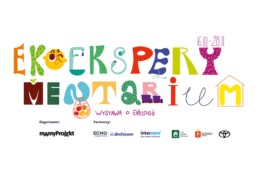
News
It is an interactive space where, through play and experience, the youngest children (from the age of 5) learn how to take care of the environment in a simple way. The exhibition shows that environmentalism is not about sacrifices, but about everyday, clever choices that each of us can implement in our own homes.
What awaits visitors
In the EcoExperimentarium, visitors move into a model flat:
- in the living room catch 'energy vampires' who devour electricity,
- in the bathroom discover how to save up to 700 litres of water a week,
- in the kitchen, they learn how to segregate waste properly,
- In the bedroom, they reflect on why it makes sense to have less stuff.
It's a place where fun meets learning, and where children and adults can feel that their everyday decisions really do matter.
Interzero again as patron of the exhibition
Interzero has once again become a partner of the EcoExperimentarium.
As Katarzyna Kacz, Project Manager CSR and Environmental Education, points out:
"For years, we have been supporting the EcoExperimentarium exhibition, which shows children how to take care of the environment every day in an engaging way. In the kitchen, of which we are a partner, we teach that waste does not magically disappear from the cupboard under the sink - its proper segregation has a real impact on our world."
Through such partnerships, the EcoExperimentarium inspires the next generation to live consciously in the spirit of zero waste and sustainability.
When and where
Place: Centre for Ecological Education, 3a/3 Papyrus Street, Warsaw
Deadline: 16 October - 28 November 2025.
Admission: free
Visiting hours: Monday - Friday: 9:00, 11:00, 13:00 - organised groups
Advance registration is required - places are limited.
The EcoExperimentarium has already been visited by more than 60,000 people in 17 Polish cities, including Łódź, Wrocław, Krakow and Poznań. This proves that environmental education through play really works.
Come, experience, see how you can be eco - and be inspired to take action in your home.
You are cordially invited!
Recycling protects resources: Interzero publishes climate and resource balance sheet
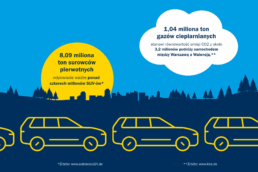
Recycling is about conserving resources: in 2024, Interzero saved approximately 1.04 million tonnes of greenhouse gas emissions and 8.09 million tonnes of primary resources
A study by Fraunhofer UMSICHT again confirms the positive impact of circular solutions and recycling on climate and resource savings. By recycling 1.94 million tonnes of materials in 2024, Interzero saved around 1.04 million tonnes of greenhouse gas emissions and 8.09 million tonnes of primary resources. The main factor for these savings at Interzero was the circular management of plastics.
Berlin/Cologne
Securing the future through the circular economy: recycling is an effective tool for reducing pressure on the planet and meeting Europe's climate neutrality targets. The Interzero study "resources SAVED by recycling 2024", published today, illustrates the tangible benefits for climate and resource protection: according to calculations by the Fraunhofer Institute UMSICHT, Europe's leading provider of closed-loop economy services recycled around 1.94 million tonnes of materials in 2024, saving 8.09 million tonnes of primary resources. This is equivalent to the weight of more than four million SUVs*. At the same time, Interzero's recycling activities avoided a total of 1.04 million tonnes of greenhouse gas emissions. This is equal to the CO₂ emissions from around 3.2 million individual car journeys between Interzero's locations in Warsaw and Valencia**.
"Every resource counts - the circular economy combines resource conservation with responsibility for future generations." says Jan Kroker, CEO of Interzero Group. "Together with our customers, we drive sustainable innovation that delivers environmental benefits and increases economic competitiveness."
Example: With its internationally recognised Competence Centre for Recycled Plastics, Interzero supports industry and trade in the transition to recyclable plastic packaging and the use of recycled materials. This allows companies to better position themselves in the market - and also to meet the legal requirements of the new European Packaging and Packaging Waste Regulation (PPWR), which came into force in February 2025.
The results of the Fraunhofer UMSICHT study also underline the importance of consistent recycling, particularly in plastics and lightweight packaging: this fraction accounts for 49.9% of the total amount of materials recycled - and is responsible for the greatest environmental impact: in 2024, Interzero achieved 54% of resource savings and as much as 62% of total greenhouse gas savings by recycling petroleum-based materials.
"These figures confirm our commitment to modern plastics recycling and motivate us to further improve our recycling of Yellow Bag packaging waste," says Jan Kroker.
From household waste segregation to advanced sorting and processing: many elements need to work smoothly for raw materials to be efficiently recycled. With the study "resources SAVED by recycling", Interzero has been providing important arguments for circular transformation for more than 15 years. The annual Fraunhofer UMSICHT calculations not only demonstrate the positive environmental effects of Interzero's activities, but also support the company's customers in communicating transparently about sustainability.
* Conversion examples are based on (sources):
https://www.autoscout24.de/informieren/ratgeber/kfz-technik/gewicht-von-autos-frueher-und-heute/
** Basis of calculation: average CO₂ emissions of new passenger cars registered in Germany in 2024 according to the Federal Office for Motor Transport, www.kba.de.
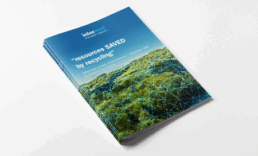
Leaflet for the study "resources SAVED by recycling" 2024
About Interzero
Interzero is one of the leading providers of product, material and logistics closure services and an innovation leader in plastics recycling with the largest sorting capacity in Europe. Under the slogan 'zero waste solutions', the company supports more than 80,000 customers across Europe in the responsible management of recyclable materials, helping them to improve their own sustainability performance and save primary resources. With around 2,000 employees, the company has a turnover close to one billion euros. According to Fraunhofer UMSICHT, Interzero's recycling activities could save 1.04 million tonnes of greenhouse gases compared to primary production and 8.09 million tonnes of primary raw materials in 2024 alone. As a pioneer of the circular economy, Interzero is the winner of the German Sustainability Award and a related special award in the field of 'Resources' for 2024.
Interzero launches new "Fit for Recycling" service
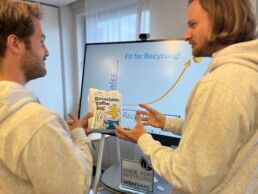
News
With 'Fit for Recycling', Interzero is introducing a new service that enables companies across Europe to obtain a reliable, practical and cost-effective assessment of the recyclability of their packaging. The procedure is based on an analysis of packaging specifications, complemented by laboratory tests carried out at Interzero's Competence Centre for Recycled Plastics, and provides clear results in a recyclability report, including a PPWR classification.
The launch comes at a crucial time: as part of the planned Packaging and Packaging Waste Regulation (PPWR), the European Union will significantly tighten the requirements for recyclable packaging. From 2030, only packaging that meets certain recycling criteria can be put on the market. Germany has been a pioneer in this field for years - Interzero actively contributes its long-standing expertise to European committees and discussions. The laboratory-tested "Made for Recycling" methodology offers a scientific test that analyses the packaging under realistic conditions. Packaging that passes this procedure can carry the "Made for Recycling" seal - a visible seal of quality that provides clear guidance for retailers and consumers alike. "Fit for Recycling" now gives manufacturers and distributors an additional, practice-oriented assessment tool. It clearly indicates whether and to what extent their packaging already meets future regulatory requirements - and at the same time highlights concrete optimisation potential for the further development of packaging design.
How "Fit for Recycling" works
- Companies send Interzero packaging samples, the relevant specification and a completed checklist with all relevant information.
- Experts examine the packaging on the basis of specifications and an information sheet, supplemented by laboratory analyses of key packaging parameters.
- The results are presented in an easy-to-understand report - along with a PPWR-compliant classification.
Practical support for PPWR compliance
"With Fit for Recycling, we offer companies an uncomplicated way to check their packaging for PPWR compliance in a timely manner." - Jonathan Scheck, packaging engineer at Interzero, explains. "Our customers benefit from reliable analysis based on actual packaging specifications and supported by laboratory data - fast, reliable and practice-oriented."
Media contact:
Corporate Communications Interzero
Christina Bunnenberg
Tel: +49 151 72476504
presse@interzero.de
ROP - system optimisation or hidden tax? Free Interzero webinar on the UC100 project
Invitation to Interzero webinar - "ROP - optimization or hidden tax? Analysis of the UC100 project"
To help businesses and organisations understand the changes that the bill will bring, Interzero invites you to a free webinar, which will take place:
25 September 2025., hrs. 10:00-12:00
Webinar programme:
- Presentation of the proposed ROP model (IOC concept)
- Roles and responsibilities: producers, recyclers, municipalities, ROP organisation
- Relationship of the UC100 project to European law
- Business impact analysis
- Q&A session with an expert
Leading the way: Przemyslaw Kuna, Managing Director at Interzero - an environmental expert with many years of experience in auditing and consulting for companies.
Advantages of participation:
- Two-hour online meeting without leaving the office
- Possibility to ask questions live via chat
- After the webinar, access to the speaker's presentation
Register today. You will receive a link to the broadcast by email.
You can also find out more about ROP in the entry: Ministerial draft ROP under a wave of criticism from manufacturers
